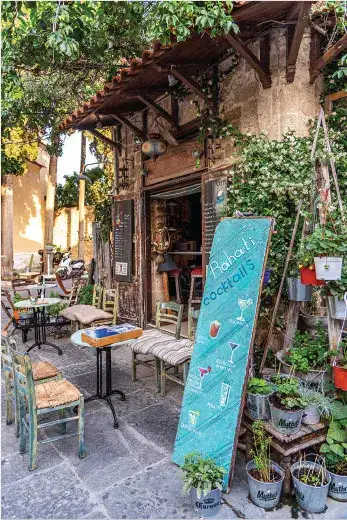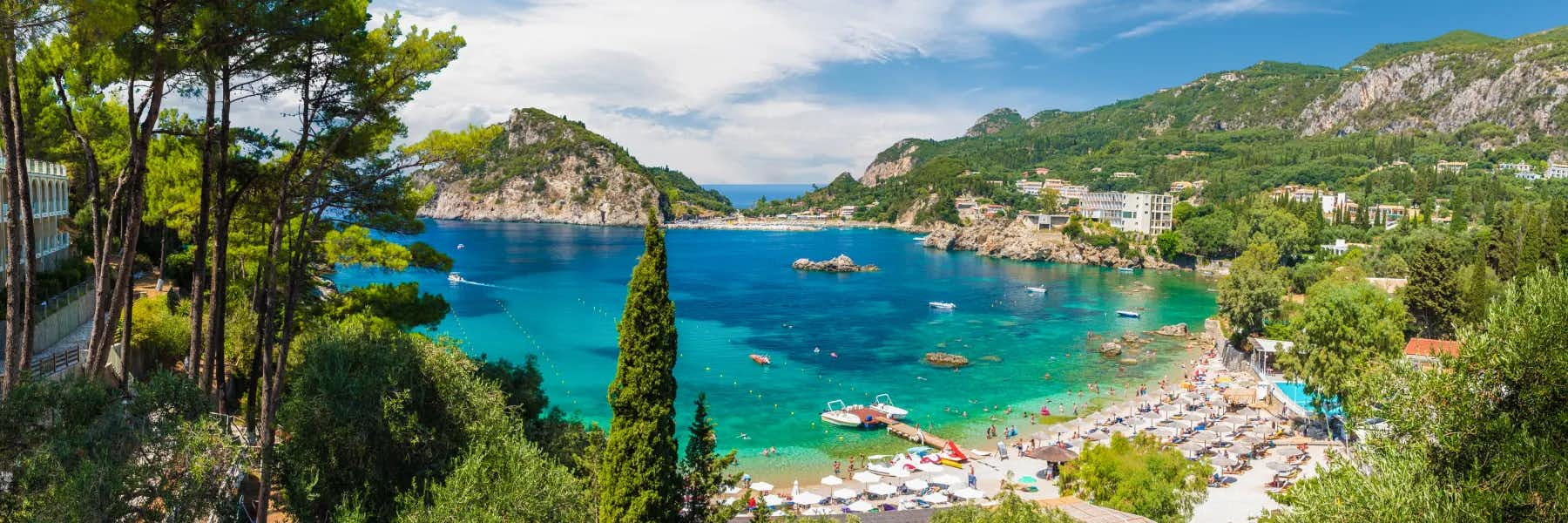"My Stress Level Here is Nothing"
Names: Griselda Valencia & David Daoud From: San Diego, California Living in: Corfu, Greece
"We explore, we travel. In summer, we’re at the beach six or seven times a week," says Griselda Valencia. She lives on the Greek island of Corfu with her husband David and their young son.
David first visited the country in the 1970s, when he spent time in Matala on the island of Crete. At the time, the village was little more than an unknown stop on the hippie trail, popular because you could sleep for free in the caves carved into the beachside cliffs. That all changed when it featured in two songs on Joni Mitchell’s platinum-selling album, Blue. Overnight, it became an international destination for independent travelers.
By that time, though, Greece had already captivated David.
A successful career as a San Diego florist filled the decades from the 1970s all the way to 2016, when he and his then-girlfriend Griselda and their son Sebastian moved to the Greek island of Corfu. Griselda and David chose to get married in Greece, even though it meant converting from Catholicism to the Greek Orthodox faith.
Their local marriage was just one step in their full immersion into Greek life. They now live in Kira Krisikou, a coastal village with the country’s largest marina, just five miles outside of Corfu Town.
David and Griselda paid $265,000 for their seaview home, which at the time came with four bedrooms. Now, after they’ve modernized and renovated it to their own specifications, it’s a three-bedroom, three-bathroom home. "We’ve spent around $250,000 on the renovation," Griselda says. "We could have found something cheaper inland in one of the villages, but we wanted to be close to Sebastian’s school and all the after-school activities, which take place in Corfu Town."
Free Report: Best Places in the World to Buy Real Estate
Free Report: Best Places in the World to Buy Real Estate
Sign up for IL's postcards and get the latest research on the best places in the world to retire. Including boots-on-the-ground insights on real estate and rental trends. Simply enter your email address below and we'll send you a FREE report - The World's Best Places to Buy Real Estate.

By submitting your email address, you will receive a free subscription to IL Postcards and special offers from International Living and our affiliates. You can unsubscribe at any time, and we encourage you to read more about our Privacy Policy.
"In California, a home like the one we have here would cost big money," says David. "Two to three million dollars. You couldn’t buy a place like it in La Jolla, San Diego, where we lived."
In California, our Greek home would cost $2 mill.
In fact, it was partly because of the excellent educational opportunities that David and Griselda chose Corfu. Griselda was particularly impressed by the fact that Sebastian could study in English and follow the United Kingdom educational curriculum at the Andrioti International School.
"He can be more independent here, too. Because it’s an island, you can feel much more comfortable letting your child out on his own. You can’t compare it to the U.S. My stress level here is nothing. I’m calm here. I can wear jewelry, walk alone at night, and not worry. I was brought up in Los Angeles, with guns, blood, riots. There’s none of that here," says Griselda.
The calm has allowed Griselda to explore the interests she never knew she had. Painting in acrylics is just one example. "I don’t think I would be painting in San Diego," she says. "I had to work, be a mom. You have to forget about being you. Here, people open their hearts to you. It goes both ways. It’s beautiful. In San Diego, I took Xanax for stress. Here, I don’t need it anymore. I sketch, I paint. That’s enough."
It helps that the family can count on excellent, affordable healthcare. "The medical system is superb by U.S. standards," David says. "Maybe not so modern, but the staff are well trained and you get instant appointments. If you want an MRI, it’s $200. In 2012, I had a colonoscopy in the U.S. That cost me $15,000. Here, it’s $400. We get health insurance from a company called Allianz. It costs €4,000 ($4,390) a year. In the States, we were paying $1,200 a month, with a $6,000 deductible!"
"The doctors treat you like a human being here, not a statistic," says Griselda. "And they only give you what you need, not endless prescriptions. David had a physical therapist come to the house… it cost €30 ($33) a session. He had a steroid shot in the foot, from a doctor who qualified in Austria, for €60 ($66). It’s so much cheaper here."
It’s all positive for the family, who get to enjoy the more relaxing aspects of living on a Greek island now that the practicalities are taken care of. Now retired and living in Greece as recipients of the country’s golden visa, the lifestyle is something David could only dream of back in California.
"As a father, you want to provide the best environment for your child," he says. "Corfu is that place. And the costs are very reasonable. We spend about €4,000 ($4,390) a month for everything—food, outings, our son’s after-school activities, health and home insurance, car costs… You can do it for less, too. Standard living costs here are about €2,000 ($2,196) a month. "You need at least a year to explore Greece, to see which part of it fits you best," he continues. "And I’m still learning."
Get Your Free Greece Report Today!
Get Your Free Greece Report Today!
Learn more about a slower pace of life in Greece and other countries in our free daily postcard e-letter. Simply enter your email address below and we'll also send you a FREE REPORT — Retire in Greece—Find Your Dream Retirement in This European Archipelago.

By submitting your email address, you will receive a free subscription to IL Postcards and special offers from International Living and our affiliates. You can unsubscribe at any time, and we encourage you to read more about our Privacy Policy.
"Integrating Into Life on Rhodes Has Been Easy"
Name: Francisco Huerta From: Sacramento, California Living in: Rhodes, Greece
"Try the orange cake," Francisco Huerta advises. "It’s their specialty." We’re at Fornariko bakery, a deceptively large café tucked within the fortified medieval walls of old-town Rhodes. From the street, it looks like a hole-in-the-wall sort of place, but when you enter, it expands to a bakehouse, courtyard tables, and various nooks and annexes.
The cake—a yeasty sponge drizzled with bitter-orange syrup—is worth the trip. Having lived on Rhodes for five years, Francisco knows the island insideout. Where to get the best coffee, what to see, but most importantly, how to handle the administrative hassles of moving to Greece.
"There’s a lot of bureaucracy, for sure," he explains between forkfuls of orange cake. "A lot of it on the American side. I had to travel to Los Angeles, to the Greek consulate there, show bank statements, an FBI check, credit check, medical check… it took about 11 months in all. I was working for Meta (formerly Facebook) at the time. Now I’m in Rhodes, working with a soccer club, and I’m happier than ever. I moved my entire life to the other side of the world just to chase what I wanted to do."
Finding accommodation on Rhodes was more difficult than anticipated. The island is hugely popular with tourists from northern Europe who flood the market between May and October. Owners make enough from Airbnb during the summer to bankroll their real estate investment. For the rest of the year, the island is near-deserted.

That can be a blessing for the flexible traveler who enjoys the calm of off-season island life. When Francisco first arrived, he rented a one-bedroom apartment in Rhodes town for €300 ($329) a month. He also managed to negotiate a deal with a car rental firm to rent a car for €250 ($275) a month. "In the off-season, the cars are just sitting there, gathering dust," he explains. "They’re happy just to make any money from them. So you can get a pretty good deal. It’s similar with home rentals. Away from Rhodes city, it’s significantly cheaper to rent in winter. You can get a studio apartment in Lindos for less than €200 a month, but it’s utterly dead in winter there."
The year-round population of Rhodes island is almost entirely based in Rhodes town, although even there, a lot of the rental accommodation is set aside for summer visitors.
"Long-term rentals are rare," Francisco admits. "I eventually found one via a Facebook expat group, which I share with a friend. We’re paying €600 ($659) a month for a two-bedroom, two-bathroom apartment. Utilities aren’t included in that, and it gets cold here in winter, so heating can add €150 ($165) a month. But it’s 300 meters from the beach, and I’m paying 30% of what I’d pay in California. No complaints."
So layered with history, it’s a daily reward.
Those rental savings help offset some of the other costs of life on Rhodes. "Compared to the U.S., some things are expensive here," says Francisco. "Olives, local vegetables, and dairy—are cheaper, but international brands are expensive. Clothes and shoes cost about 10% more.
"Eating out in Rhodes town is relatively costly, too. It’s about €20 ($22) for a single course at a restaurant here. Out of town, the prices drop. In Archangelos, mid-way down the island, I had a multi-course meal of roast chicken, with salad and bread, that cost €20 ($22) for three people. Here in Rhodes town, that would easily cost €50 ($55)."
It’s important for long-term expats on Rhodes to get to grips with the Greek language, says Francisco. "It’s difficult to do admin and practical stuff without it, but people are really nice about it, and helpful, if you try to speak Greek. It generates a lot of goodwill. I used Duolingo to learn the basics. It helped, but there’s nothing like full immersion."
Integrating into life on Rhodes has been easy, especially with a little effort to speak the language. "Another thing is that it’s so safe here," says Francisco. "I can walk around at 3 a.m. and I’ve never once felt the need to even look over my shoulder." Living in a city so beautiful and so layered with history that UNESCO categorizes it as a World Heritage Site is a daily reward, too.
"I love it. I’m enjoying life, meditating, going to the sea. I can breathe here, it feels amazing. You go out with friends here, especially for mezze on Sundays [multiple plates served family-style], and people just sit and talk after they eat. For hours. It’s cheaper than therapy. In the U.S., I was killing myself trying to be an entrepreneur. Every guru is selling us a solution, but the only solution for me was to leave. I feel blessed to be living this experience. To be at peace, joyful, happy."
Free Report: Best Places in the World to Buy Real Estate
Free Report: Best Places in the World to Buy Real Estate
Sign up for IL's postcards and get the latest research on the best places in the world to retire. Including boots-on-the-ground insights on real estate and rental trends. Simply enter your email address below and we'll send you a FREE report - The World's Best Places to Buy Real Estate.

By submitting your email address, you will receive a free subscription to IL Postcards and special offers from International Living and our affiliates. You can unsubscribe at any time, and we encourage you to read more about our Privacy Policy.
